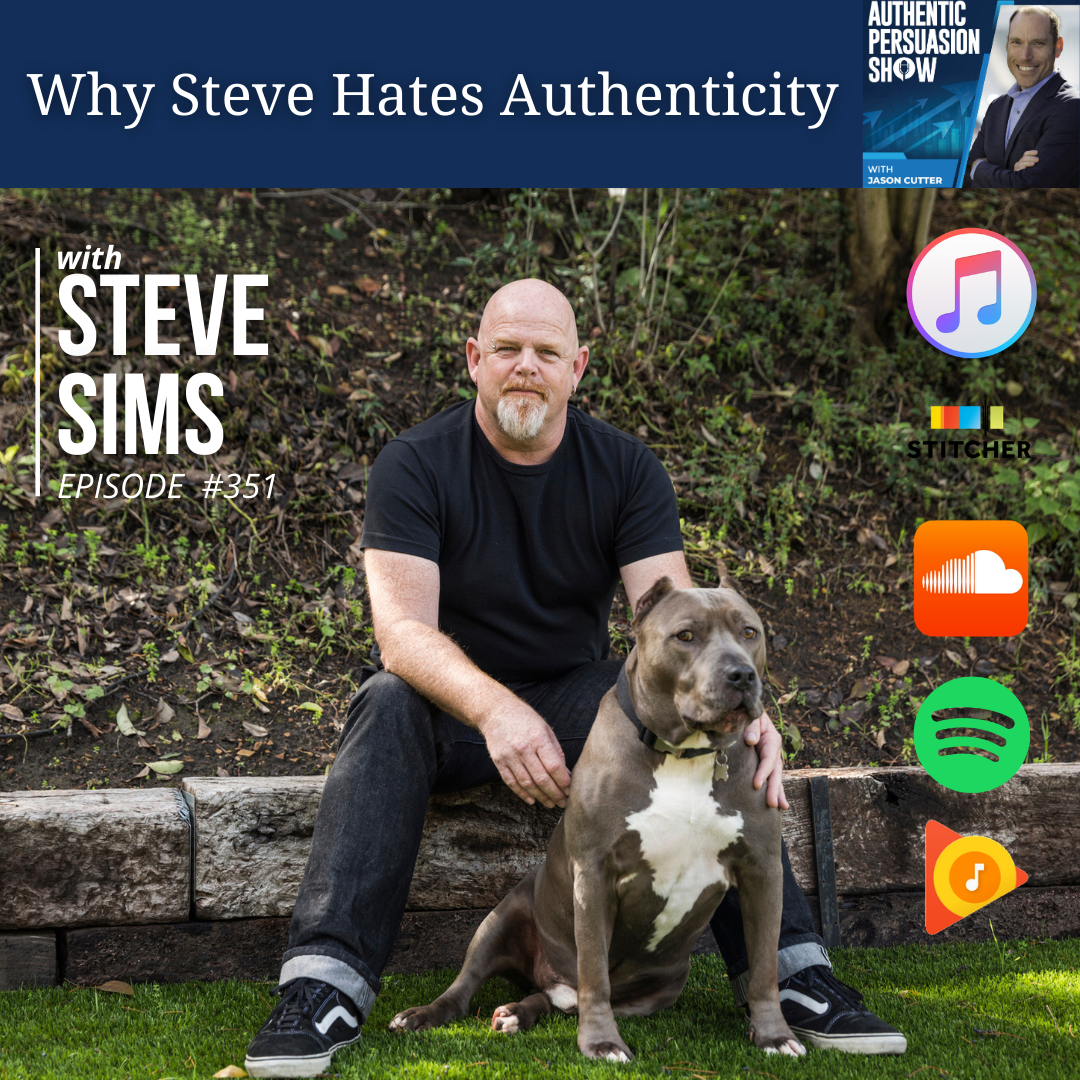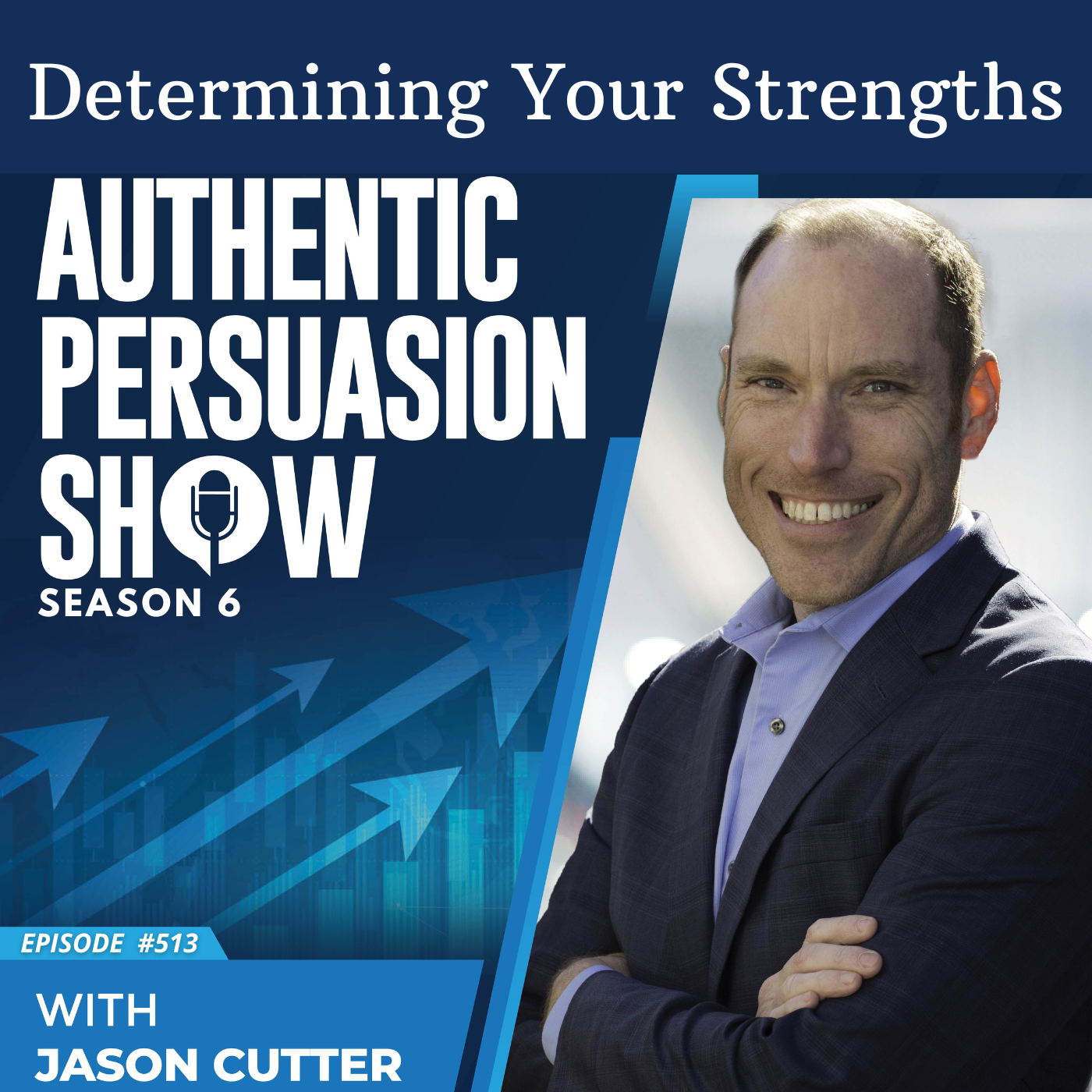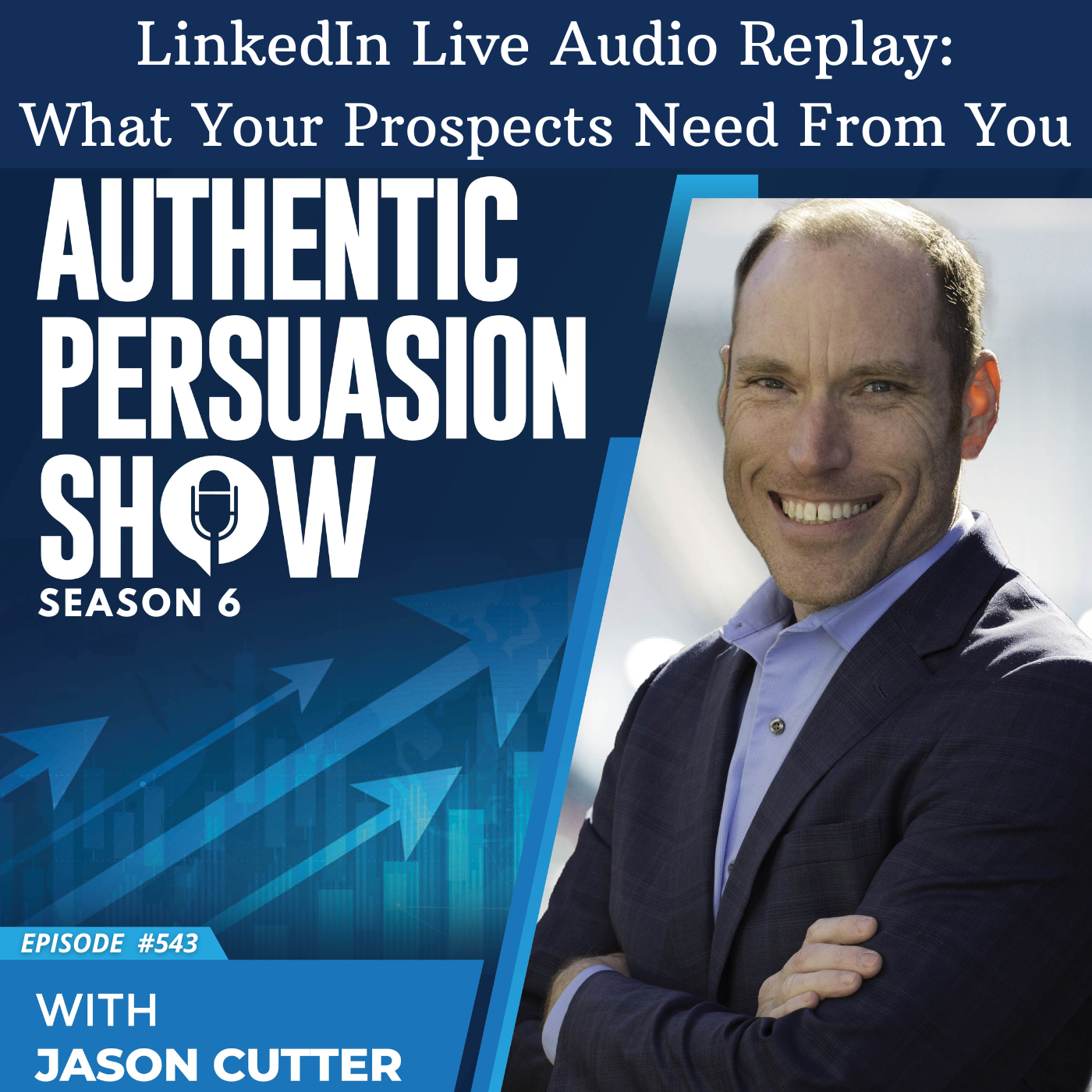Show Notes
This is the second segment of the conversation I had with Joe.
In Part 2, Joe and I talk about:
- Understanding your prospect’s situation, and then doing something about it
- Knowing the right questions to ask
- What Joe would have done differently, now looking back on his first sales job
Download The Power of Authentic Persuasion ebook
Enroll in the Authentic Persuasion Online Course
Connect with Jason on LinkedIn
Connect with Joe on LinkedIn
Joe’s Bio:
He is the founder of The Executive Recruiter Network, an Advisor to Facebook, a LinkedIn Consultant, and with his firm Tash Rizzo – he helps recruiting and staffing companies with their lead generation strategies.
Joe’s Links:
Website – https://tashrizzo.com/ or executiverecruiternetwork.com
E169 – Transcript
Jason: Welcome back to another part of the conversation I have with Joe Rizzo. This is the sales experience podcast. My name is Jason Cutter and I am super excited because this conversation with Joe, first off, he did a lot of listening to podcast before we spoke. And I know as you listen to this, it might sound like maybe he just did that homework so that he could, you know, get on my good side and make it seem like he knew what he’s talking about. But literally I’ll tell you that we are an alignment on a lot of things. So stuff that he’s talking about is near and dear to me and fits in with my experience in sales. And then also what I see as challenges for salespeople. So please take lots of notes. Please absorb this. Whether you’re in sales or you’re a manager, you’re owner of a company, whether you’re in recruiting, which is who he’s focused on, or any other sales vertical, you know, it’s just a great conversation. A lot of fundamentals that we talk about. So here you go part 2, enjoy.
Jason: So if you’re talking to someone, whatever their issue might be, if you can pull that out. I’ve always used like third party stories of other people I’ve helped relative to their situation, right. Whether single mother or you know, married with kids and dealing with this or you know, a single person living at home, whatever it is, it’s, you know, tying it in so they know that they’re not alone. There’s other people in situations like theirs and that it’s safe to move forward and you know, it will be for the best.
Joe: I love the fact you mentioned stories. I think stories are a great way to know whether it’s a testimonial or a story, you know, and really if you’ve been in business long and hopefully have those stories kind of packed away. Right. Okay. This is a small business owner, one, you know, solo preneur all the way to a bigger business. Depending on who you’re working with, like you just talked about right now is understanding their situation and hopefully having something that’s similar. If not, find a story that’s similar they can tie into yours cause that’s a great way to do it. People like stories too.
Jason: Yup. And then the other part that you mentioned, which is interesting is asking, you know, in your, your current role asking recruiters if they have a marketing budget, you know, always there’s that dangerous part of asking somebody a question where they could say no to or throw up a wall. Like you’re saying, like go about that and use your fact finding to get the information that you need to help with your sale or your consultation without like, you know, helping them throw up a wall in your face.
Jason: But fundamentally for any sales people listening to this, if you haven’t experienced it for is money is never an issue. It’s only value, right? Like people always find enough money, they will always find them money needed, whether it’s a business owner or it’s an individual, there is always a way to find the money if the value is there. And so the year a hundred percent correct. I mean work on the value work on, you know, what it is that they’re going to get from it, what problem you can solve and then the money part’s easy.
Joe: It’s a good point. And people use the doctor analogy, right? Like if I have a cure for you, but it’s so tricky, we’ll have the money and, and I’ve gotten tripped up on that. It’s like asking that one, we’re getting getting cat that I’m pumped and part of like, okay, like well can you find it?
Joe: Can you find the money? I work the dominant said I don’t want anyone to ever draw blood. I have to sell their blood to work with them because at the same time, like people have the money. And so it’s our job to make sure that Hey, we’re prescribing.
Jason: And here’s what’s funny is so you know who’s not familiar, you could sell blood, you can sell plasma, you can sell all kinds of, you know, bodily fluids to make money. And obviously you don’t want to push your people, you know, whenever you’re selling, you don’t want to, you know, push them to be so desperate they got to do it. And on the flip side, my mental process and strategy is I want that person to understand the pain that they’re in or will be in if they don’t fix the problem or achieve their goal. Right.
Jason: So positive or negative. So much so that they would be willing after we get off the phone or get done with our meeting to go down and donate some fluid so they can come back and sign up for what I’m helping them with. And again, it’s because I’m seeing them in a different future, in a positive way, whether again, it’s achieving a goal or avoiding pain. I want them to feel the urgency so much that they’re like, I don’t care what I’ve got to do, but I’m going to go do it and I’ll be right back.
Joe: Yeah. So on that, it’s funny you say that. So how do you find it most effective? Do you find having them paint the picture or are you kind of painting their picture or is it a mix? Depending on the person.
Jason: It’s a mix. But you know, kinda like you said with the insurance side, right. And, and even what you’re doing now is it’s all about asking those questions and uncovering it and then helping them feel and realize it, what it would be like and what that future path that they’re on right now if they don’t do anything. And then also how great it will be if they do something about it or making it so clear with the return on investment. Right. It’s a business decision, but helping them feel it by my questions and their answers.
Joe: Gotcha. Okay. So what are your questions? Their answers. Yeah, that makes sense. And I was looking at like, okay, I don’t want to say imagine this. Like, you know, Hey, what’s this for? At the same time that I, I always find that mix of getting the person to help them realize the cliche that it’s come from them, their decision. It’s much more powerful than me painting them. Picture trying to get it. Yeah, help them paint a, but you get those people that are just there, the one answer people, you’re trying to, every candidate claw your way past the first layer. You’re digging together everything out and you’re like yes, yes, no, yes.
Jason: Well, and one of the things that I do instead of the imagine if you did this or imagine your future, if I’m more of a, so based on what you’re telling me, if you don’t do this, this is what’s going to happen or so based on what you’re telling me, this is where you’re headed. You know, if nothing changes, you know, kind of, you know, like okay, this is your thing. Not imagine this world, but like you’re on this path, you’re on this train. It is going to crash. Like I just want you to know that. And then to your point about the one word answer people, I mean, I think that really comes down to ask your questions, follow your process and trust and come from abundance that not every person you talk to, you’re going to sell and be okay with that.
Joe: It’s a great point. And some of those new ones, others, that’s just how they are, their personalities. That was the thing I had to understand. There’s four different types of people or more than 40,000 people, but you can put them all in different quadrants.
Jason: And when you, but then you’ve also, yeah, understanding like everybody’s different and don’t prejudge. So I see so many reps fail at closing more deals. They take that one word answer person and they’re literally like, Oh, this person’s not interested. They don’t care. They’re totally disconnected. I can’t get the pain. I can’t get there. I can’t get their story like they’re giving me nothing. I got nothing. And if the sales person just continues with their process, assuming the sale, that one word answer person will usually surprise them and be like, okay, sounds good. How do I sign up? Right?
Joe: Yup. Yeah. They’re already thinking ahead. It’s maybe why they only answer one word. So you’re right. It’s interesting. Some of the ones that surprise you are some of the best ones.
Jason: Yeah. Yeah. Those will always blow your mind. So question for you, different from the uh, the standard ones I asked cause I was thinking about it as you’re talking and you’re describing your sales experience now and then you’re talking about what you learned when you were in insurance and we had talked about that previously. Knowing what you know now, this many years in the future, what would you have done differently or what did you take on faith in the beginning days and insurance and stuff that you did after that that they taught you thought, okay, this is the right way to go and now you look back and go, no, this would have been a better way.
Joe: That’s great. So I think for me it was just work hard, like hard work pays off. So I grew up in a military house, wasn’t like my parents weren’t militant, but you know, was like, Hey, hard work. I saw my dad work hard. I, you know, I, I watched it so I just believed if you just kept working hard that things will work out, which I still believe, but I was so head down and focused with even with sales that I didn’t always look for the easier path. Like we here work smarter not harder and it’s like no, no work harder. Like well which one is that? We’re, we’re hard as a sales person I think you have to find like follow ups always going to be something that’s important. So that’s part of hard work. How do I work smarter and harder? So I think looking back for me a big turning point in my sales was marketing.
Joe: Believe it or not, learning how to do marketing because it helped me have those initial conversations. So just understanding marketing sooner would’ve helped me and really just taking a breath, like you said, having the abundance mind when my mind shifted to understanding, there’s a lot of opportunity out there like having to have to make the sale. People can smell that. Yeah, they hear from you, I need this. Come on buddy. Like this for me, like understanding that and once I started getting that, I started stepping back and really listening, listening to people. And when they knew that I cared enough to try to solve their problems, sales just started. They would, they just would come in. sorry, I just, I just trust you. And I think the reason I was able to build that trust, cause I really was just listening so when people don’t listen, and so I thought I was a good listener, but I know I can see a turning point when I really started understanding what you mentioned, the abundance factor of it, of just the mindset shift of like, Hey, I’m going to help people in the more people I actually help.
Joe: Like I deserve to be paid for that help and I will be paid for that help. I will be rewarded for that.
Jason: I love it. I love it. And it’s so true, the listening part and the evolution. I mean that’s just part of life and getting better and getting more experience, especially when you’re new in sales and there’s so much going on and then the whole commission breath, right? And the desperation side that you’re talking about, it reminds me of the phrase, you know, never want the deal more than the other person, right? Because then when you do, then you’re pushing forward and the other person has the advantage and you don’t. But it’s interesting because it’s a dangerous one. And let me know your thoughts on this because if you have that attitude, which is let’s say pure abundance, sometimes people can say, okay, well if I come from abundance, that means there’s more than enough. So we’ll have a conversation, and I talked about this, you know, in an episode before on order takers where it’s like, okay, if you want the deal, great, if not like whatever.
Jason: There’s more efficient in the sea. And I think that’s important to a point, except when you have a qualified prospect who you know you can help, who will be better off with what you have, then it’s like a different pressure. It’s a different focus on wanting the deal, but it’s for them and not for you.
Jason: Alright. That’s it for part two. Again, go to cutterconsultinggroup.com you can find show notes, transcript, all of Joe’s links. As always, keep in mind that everything in life is sales and people remember the experience you gave them.
![[E169] Sales Fundamentals with Joe Rizzo – Part 2 of 4](https://episodes.castos.com/salesexperiencepodcast/images/Joe-Rizzo-Cover-Image.png)


